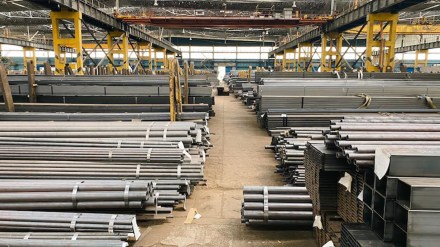Jindal Steel International, part of the Naveen Jindal Group, has submitted a non-binding offer for acquiring Germany’s largest steelmaker thyssenkrupp Steel Europe (TKSE).
Focus on Green Steel and Employment
“We believe in the future of green steel production in Germany and Europe. Our goal is to preserve and grow thyssenkrupp’s 200-year industrial legacy and help transform it into Europe’s largest integrated low-emission steelmaker,” Narendra Misra, director of European operations at Jindal Steel International said in a statement on Tuesday.
He added that the company looked forward to a constructive dialogue with thyssenkrupp and employee representatives.
The steel division generated €10.7 billion ($12.6 billion) in revenue and employs about 26,000 people. It is currently valued at about €7.3 billion on the Frankfurt exchange.
thyssenkrupp, without disclosing details around the financial terms mentioned in the proposal, confirmed receipt of the non-binding bid and said that it would examine the proposal closely, “particularly with regard to economic sustainability, the continuation of the green transformation and employment at our steel sites.”
It also stressed that long-term viability of the business, workforce security, and the energy transition would guide its decision.
“Jindal has presented a forward-looking concept for thyssenkrupp Steel that could help make decarbonisation more affordable. The plan would secure steel production in Germany and create new business opportunities. Among other things, the proposal includes completing the DRI project in Duisburg and establishing additional electric arc furnace capacity with a financial commitment of more than €2 billion,” the statement said.
Integrated Low-Carbon Production Plan
As part of the proposed acquisition, Jindal Steel International has proposed that the group’s hydrogen-ready DRI plant in Oman, which is slated to be start operations by 2027, will provide supply security to thyssenkrupp Steel’s capacity, and also accelerate the shift towards low-carbon steelmaking.
The firm also added that its iron ore mines in Cameroon will supply to thyssenkrupp Steel Europe’s under-construction DRI facility in Duisburg, besides Jindal’s Oman DRI plant, in order for an integrated “mine-to-metal” approach for thyssenkrupp Steel’s operations.
The proposal also emphasises long-term security of steel production in Germany, a key assurance given persistent worries about the future of Europe’s heavy industry amid soaring energy costs, rising interest rates, and subdued steel demand. In its plan, Jindal Steel International has highlighted not just capital injection but also its experience with low-emission steelmaking technologies, which it believes can bring down the cost of decarbonisation.
The bid, if successful, would mark a turning point in Thyssenkrupp’s years-long struggle to find a new structure for its steel division. Once the industrial flagship of Germany, the group has been steadily dismantling its conglomerate model, selling assets from elevators to submarines while wrestling with pension liabilities and steel losses. Previous attempts to secure partners — including Czech billionaire Daniel Kretinsky’s EPH Corporate Group, which holds a 20% stake — have been met with labour union resistance. ThyssenKrupp AG’s share price was up over 4% on Tuesday at euro 11.44.
